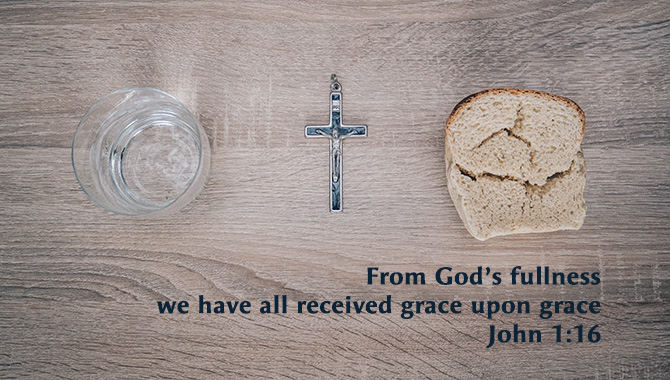So, he set off and went to his father. But while he was still far off, his father saw him and was filled with compassion; he ran and put his arms around him and kissed him. ~ Luke 15:20
What is our image of God, the Divine, our Creator? Does it lift us up and give hope? Does it anchor us in love or fear? Has our image of God changed over time?
In the fourth grade, my friend Robbie and I would walk together up Euclid Avenue to Harriet Thompson Elementary School. On the east side of the street, a creek with muskrats, water snakes, and bull snakes ran through a cow pasture with a cantankerous Brahma bull in it. “Stay away from him,” our parents warned us. The west side of the road was another pasture with a rickety, old abandoned farm house in the middle of it. We knew ghosts lived there. Danger lurked everywhere.
Robbie and I were spies for the army when we walked through this minefield. Every vehicle that passed by was the enemy looking to “capture us.” Robbie would hear a car behind us and yell, “Car!” We’d jump in the ditch, look at each other, and gleefully sing, “C-A-R, C-A-R, stick your head in a Jelly Jar.” The cars and the trucks screamed by us; we remained safe and undetected day after day.
One morning, we heard a deep throated rumbling vehicle approaching fast. “Car!” we screamed simultaneously and jumped into the safety of the ditch. As the car flew by, we heard the brakes squeal, and it pulled over on the shoulder of the road. “Did they see us?”
A car door opened, and we heard approaching footsteps on the gravel. We sank deeper into the ditch and buried our heads. Someone stopped above us. “Boys, get out of that ditch.” We froze and tried not to breathe. “Boys, I see you. You’re late for school. Get out of that ditch.”
I looked up and saw a pair of shiny black dress shoes. “Robbie, Craig, this is the last time…” We crawled out of hiding. Mr. Rayburn, our principal scowled at us. “I drive by here every morning and see you two jump in the ditch. Today, you are going to be late for school! Get in my car!”
The enemy found us. Last year at lunch recess, our class had the greatest snowball fight ever. I launched a snowball, Willie Mays would have been proud of my throw, just as Mr. Rayburn stepped out of the school doors. It landed harmlessly six feet in front of him. Mr. Rayburn was bald and the veins popped out on his forehead when he pointed at me and yelled, “Go to my office! You know it’s against the rules to throw snowballs!” He gave me a swat with his notorious wooden paddle.
Mr. Rayburn terrified me. “Get in my car boys,” he said again. He drove a candy apple red El Camino with no back seat. I lingered behind Robbie so he would have to ride in the middle next to Mr. Rayburn. I hugged the passenger side door.
“I don’t want you boys to ever be late for school again. You’re lucky that I happened to be driving by.” Funny, I did not feel so lucky. My palms were sweaty and my stomach was turning. He was probably going to give us a swat and put us in solitary confinement for the day. I did not want to be a spy any more. The covert life, hiding in ditches, was risky.
Father Richard Rohr writes, “Most people’s operative de facto image of God is initially a subtle combination of their mom and their dad, or other early authority figures. If our dad was punitive, our God is usually punitive too. If our mom (our minister or other authority figures) was cold and withdrawn, we quite often assume God is cold and withdrawn.”
Mr. Rayburn struck the fear of God within me. But my first grade teacher Miss Bird and my grandmotherly third grade teacher Mrs. Conklin, hugged each student every day. They read tender stories to us after lunch until we fell asleep for nap time.
“If our early authority figures were merciful and forgiving, we have a great big emotional head start in understanding the Gospel and who God might really be,” says Rohr. We discover that the Divine is for us, loves us, forgives us, and heals us.
If we did not have healthy role models, Grace still has a way of finding us. “From God’s fullness we have all received grace upon grace” (John 1:16).
What is our image of God and how does it shape us and our worldview?
As Rohr says, “Jesus tells us that God is like a loving parent who runs towards us while we are still a long way off and then he clasps and kisses us” (Luke 15:20). God welcomes, loves, forgives, and restores us, our communities, and the world.
Mr. Rayburn pulled into his parking space and shut off the engine. He grabbed a notepad and a pen off his dashboard and wrote, “Please excuse Robbie and Craig for being late. They were with me. Mr. Rayburn.” “Now get to class,” he said as he gave us the note. “And tomorrow leave earlier for school.”
“We will Mr. Rayburn.” And we ran as fast as we could to class. Looking back, I’m sure Mr. Rayburn was a combination of patience and impatience, grace and ungrace. Aren’t we all?
May the expansive world of grace and mercy shape our hearts. May we run towards those who are walking in pain. May our image of God give us life, courage, and compassion.
Blessings and peace,
Craig

